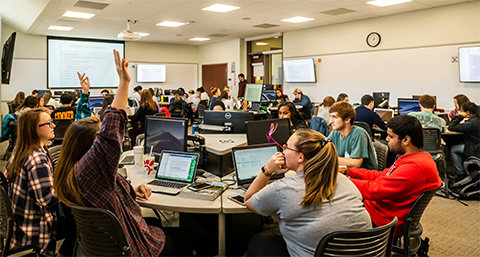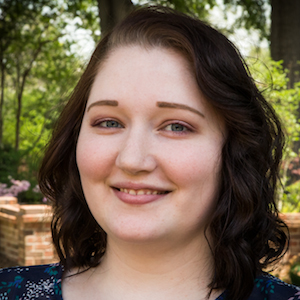How active learning affects STEM students with learning disabilities
Active learning is an instructional approach that involves engaging students with the learning process through group work, case studies, class discussions and other methods. This type of approach places a greater degree of responsibility on the learner. Students with disabilities may have unique experiences in active-learning STEM courses because most active-learning practices were designed with limited input from students with disabilities.
Researchers in the University of Georgia Franklin College of Arts and Sciences investigated how the incorporation of active-learning practices influence the learning and self-advocacy experiences of students with attention-deficit/hyperactivity disorder (ADHD) and specific learning disorders (SLD) in undergraduate science, technology, engineering, and mathematics (STEM) courses.

In a paper published in CBE—Life Sciences Education, the researchers conducted in-depth interviews with 25 STEM majors with ADHD and/or SLD (ADHD/SLD) registered with a campus disability resource center and analyzed the data using qualitative methods. Participants described how they perceived active learning in their STEM courses to support or hinder their learning and how active learning affected their self-advocacy.
Active learning could hinder the learning of students with ADHD/SLD because many accommodations that students with disabilities use were designed to be used for lecture courses.
“One common accommodation is using a note taking accommodation,” said Mariel Pfeifer, a postdoctoral research associate in the department of biochemistry and molecular biology and lead author on the paper. “Note-taking accommodations typically involve a student from the class volunteering to take notes and uploading the notes they take to a portal that the student using the accommodation can anonymously access. In a lecture course, all of the students are receiving the same information from the instructor. But when we use active-learning practices like group work, students are now working with a few other students in different places in the classroom. How does that change the notetaking process?”
When a student’s accommodations are no longer effective in an active-learning environment, that student may need to advocate for themselves with their professor and their peers.
“Both ADHD and SLD are considered non-apparent disabilities,” said Julie Stanton, an associate professor in the department of cellular biology, and senior author on the paper. “Asking for and receiving effective accommodations might be a bit more challenging, because someone won't immediately recognize that you may need an accommodation. This is where self-advocacy becomes important.”
Since the study considers the voice of STEM students with disabilities, the researchers received more in-depth responses about different active-learning techniques and were able to identify how different approaches might help or hinder student learning.
“A single active-learning practice can support successful instruction, but it could also be perceived to hinder learning,” said Pfeifer. “The heart of this research shows that it is not necessarily what type of active learning practice an instructor chooses to implement that negatively affects students with ADHD/SLD, but it is more about how they implement that practice.”
Pfeifer and Stanton hope instructors will support students with ADHD/SLD by following the recommendations from participants that are provided in the paper.
“Based on our participants’ department experiences, we created a table that highlights how instructors can use active-learning practices in a way that supports students with ADHD/SLD in their courses,” said Pfeifer. “The table gives instructors suggestions they can implement in their active-learning course today.”
This article was first published by the Franklin College of Arts and Sciences at the University of Georgia and was republished with permission. Read the original.
Enjoy reading ASBMB Today?
Become a member to receive the print edition four times a year and the digital edition monthly.
Learn moreFeatured jobs
from the ASBMB career center
Get the latest from ASBMB Today
Enter your email address, and we’ll send you a weekly email with recent articles, interviews and more.
Latest in Careers
Careers highlights or most popular articles

Chemistry meets biology to thwart parasites
Margaret Phillips will receive the Alice and C. C. Wang Award in Molecular Parasitology at the ASBMB Annual Meeting, March 7-10 in Washington, D.C.

Decoding how bacteria flip host’s molecular switches
Kim Orth will receive the Earl and Thressa Stadtman Distinguished Scientists Award at the ASBMB Annual Meeting, March 7–10, just outside of Washington, D.C.

Defining JNKs: Targets for drug discovery
Roger Davis will receive the Bert and Natalie Vallee Award in Biomedical Science at the ASBMB Annual Meeting, March 7–10, just outside of Washington, D.C.

Upcoming opportunities
No matter where you are in your career and what future path you aspire to, everyone needs leadership skills. Join ASBMB for practical strategies for building and practicing leadership skills.

Close out ASBMB 2026 with a bang
The closing reception of the 2026 ASBMB Annual Meeting will be held at the Torpedo Factory Art Center in Alexandra, Virginia.

Redefining lipid biology from droplets to ferroptosis
James Olzmann will receive the ASBMB Avanti Award in Lipids at the ASBMB Annual Meeting, March 7–10, just outside of Washington, D.C.

